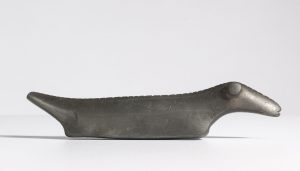Toronto to host First Nations youth from across the continent
By R.S. Konjek
A recent exhibition at the Royal Ontario Museum called Toronto Underfoot, presented a collection of Indigenous artifacts that have been unearthed from numerous locations around the city.
Tools, projectile points, carvings, and beads all provide evidence that for thousands of years Indigenous peoples have been coming to the Toronto area to live, thrive, and survive.

PHOTO COURTESY ROYAL ONTARIO MUSEUM: Birdstones were abstract stone carvings made by prehistoric North American Indians who lived around the Great Lakes and the Ohio River watershed. The one pictured above dates to the Late Archaic and Early Woodland period (2000 BCE to 100 CE) from a Royal Ontario Museum (ROM) collection was found sometime before 1896 just west of the Annex on the Quinn Farm near Dufferin Street. It’s featured in Underfoot, an exhibition showcasing the rich history of the ROM’s archeology collection that serves as a reminder of the deep roots of our local Indigenous communities.
This July, Toronto will acknowledge these links by hosting the 2017 North American Indigenous Games (NAIG 2017), and thousands of athletes and coaches from First Nations throughout Canada and the United States will come here to take part.
This is the first time in the 27-year history of the games that they will be held in Ontario, on the traditional lands of the Huron-Wendat Nation, Metis Nation of Ontario, Mississaugas of the New Credit First Nation, Mississaugas of Scugog Island First Nation, and Six Nations of the Grand River.
The games will take place at many of the sports venues that were used for the 2015 Pan Am/ParaPan Am Games.
Approximately 5,200 athletes aged 13 to 19 are expected to compete at NAIG 2017 on teams from each province and territory, as well as on regional teams from the United States. Over 6,100 athletes took part in the Pan Am/ParaPan Am Games. The athletes will compete in 14 different sports categories including archery, athletics, baseball, basketball, lacrosse, soccer, and swimming.
“You have Canada’s 150th, which is contentious for a lot of Indigenous communities and people, but it’s also a time of reconciliation”—Abidah Shirazi, Toronto NAIG 2017 Host Society
Two week-long cultural festivals are also being organized to run concurrently with the games. The festivals will showcase Indigenous artists, performers, vendors, and food at two different locations.
The City of Toronto was integral to bringing the games here by supporting the bid process and providing funding.
“You have Canada’s 150th, which is contentious for a lot of Indigenous communities and people, but it’s also a time of reconciliation right now, and these games will set the stage for the next 150 years,” said Abidah Shirazi, director of Marketing and Communications for the Toronto NAIG 2017 Host Society.
One of the themes of the games is Past, Present, Future: All One. The athletic and cultural showcases will provide an opportunity to celebrate the rich history of Indigenous peoples while giving today’s youth a path to reconciliation through sport.
All the athletes will be participating under the banner (and hashtag) of #Team88, referring to the Truth and Reconciliation Commission (TRC)’s Call to Action #88, which calls on all levels of government to take action to ensure long-term Indigenous athlete development and growth, and promote the positive impacts of sport and wellness in Indigenous communities.
“Team 88 is about taking this sporting and cultural event and using it as a platform for greater social change,” Shirazi said. “We want to bring attention to the TRC, and to highlight some of the amazing Indigenous athletes out there right now that are not being talked about and reported on.”
Many of these athletes compete at the national level.
“We want to tell the story of Indigenous athletes and help create programs and policies that will reduce barriers and create pathways for [them] to have opportunities in mainstream Canadian high-performance sport,” Shirazi said. “We really see sport as a pathway to reconciliation. Sport is universal and positive and this provides people a way to get engaged with the conversation of reconciliation. Through sport we can begin some of that dialogue, so everyone is part of Team 88.”
The games will kick off with an opening ceremony in Toronto on July 16, and the sporting competitions will run for a week. The organizing committee is hoping to have about 2,000 volunteers for the games.
“Reconciliation is about every individual,” said Shirazi. “It’s not just up to the government or Indigenous communities, it’s up to everyone. These games will unite Indigenous communities and non-Indigenous communities across Canada, across North America, and we are all one.”
READ MORE:
NEWS: Building a stronger relationship (February 2017)
FOCUS ON EDUCATION: Decolonizing our schools (December 2016)
FOCUS ON EDUCATION: Building a respectful future (November 2016)
HISTORY: Honouring those who honour history (October 2016)
NEWS: U of T committee tasked with responding to Truth and Reconciliation Commission delivers interim report (August 2016)
ON THE COVER: Tracking history in the Annex (April 2016)

